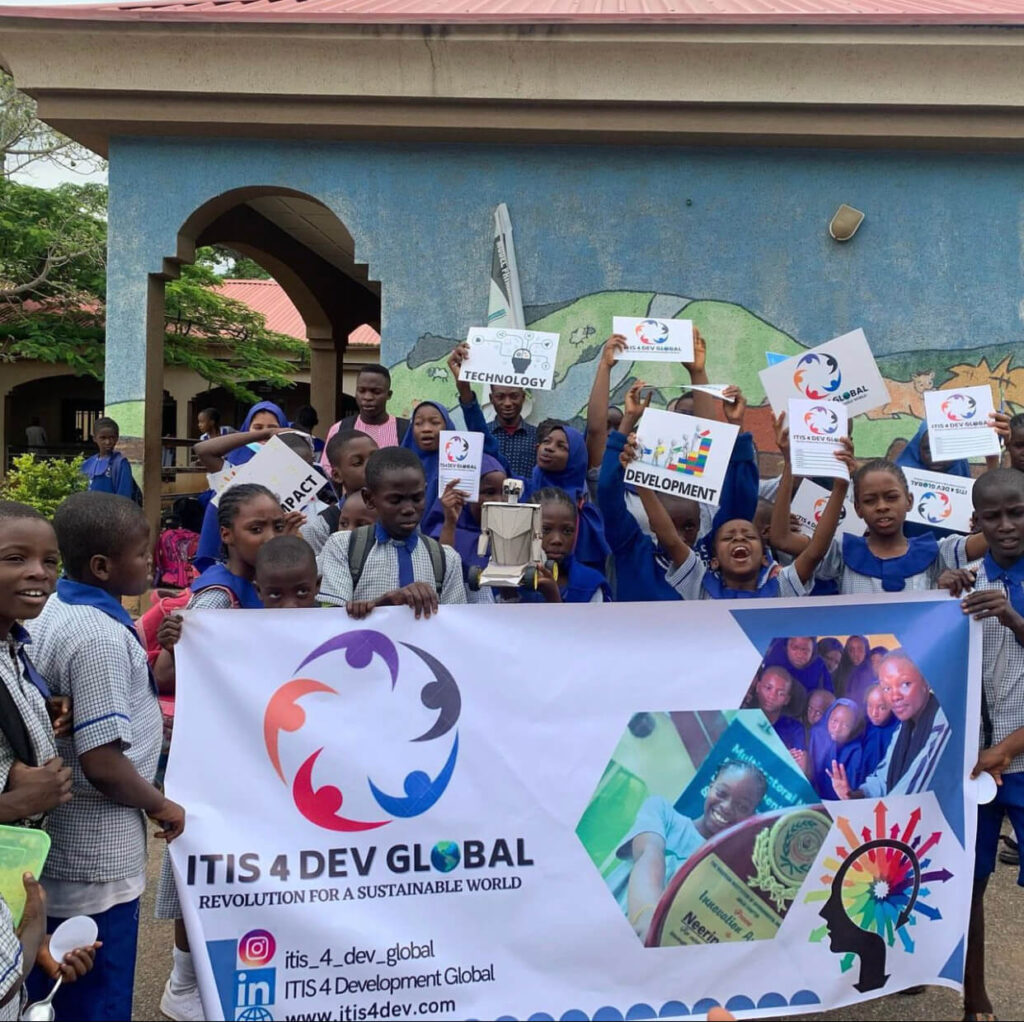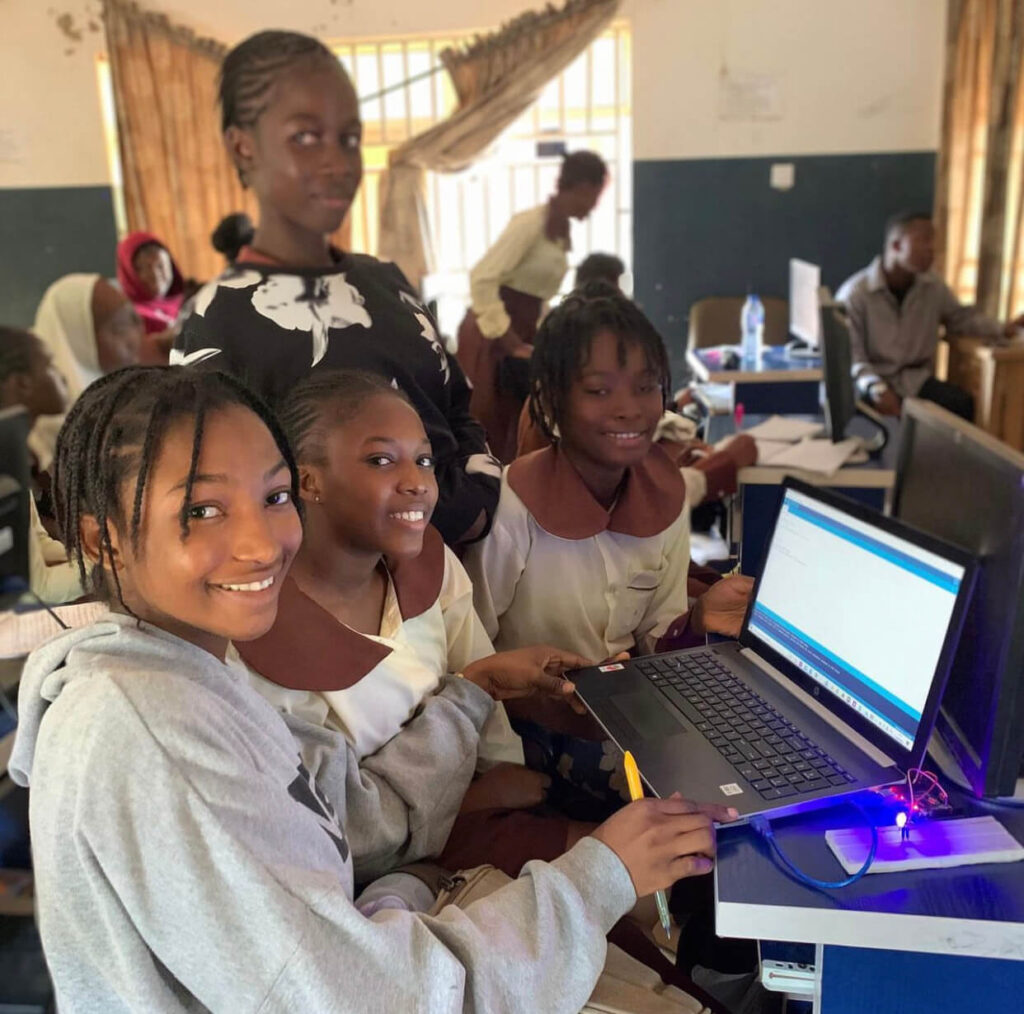How one young woman is making it her mission to include young people in conversations and solutions to a climate crisis they didn’t cause
By Maryam Bello
Maryam’s Climate Activism: Taking Action to Address Environmental Issues in Her Community
I am Maryam Bello, an impact entrepreneur and STEM activist. I am passionate about making an impact among underrepresented groups, and my journey as a changemaker began at the age of 14.
Growing up in a rural community in Nigeria, I experienced firsthand the effects of climate change. Changing weather patterns led to crop failures and food shortages, which caused poverty and hunger, affecting not only my family but also many others in the community. I realized that the people who contribute the least to climate change are often the ones who suffer the most from its consequences. This realization strengthened my resolve to be a voice for those who are marginalized and fight for a better future.
In 2020, when I participated in the Technovation Girls Challenge, I felt like I had found the right opportunity to take action. My team and I created Climax Pro, an app aimed at filling up deforested lands with trees and freeing up plastic-clogged oceans. When users reduce their plastic usage, they earn virtual energy points, which accumulate to a certain amount and can be used to grow a virtual tree that we match by planting an actual tree. Users can acquire these virtual points by taking action to reduce their use of plastics with the help of our volunteers in stands that are opened for them to sell their wastes and buy drinks with their reusable containers. Therefore, by converting simple good deeds performed by our target users, we plant trees to achieve the global goal. We were able to plant 500 trees in rural areas.
In 2021, I started my second initiative called ITIS (Impact, Technology, Innovation, and Sustainability) 4 Development Global. As the CEO of ITIS 4 Development, we have been able to impact over 800 students in 2021/2022 by providing them with STEM education and climate education. We have hosted hands-on activities such as tree planting events and are currently working with the students to address climate change issues with technology. Currently, we are working on a new and innovative climate change curriculum inspired by the youth demand at the COP27 (Conference of Parties) where I spoke as a Technovation youth representative/panelist.
Creating an actionable, relevant climate curriculum for young people
 The curriculum is for a fellowship program that we are about to launch at ITIS, which will be learner-centered, action-oriented, and engaging for young people. The curriculum will not only discuss the issues related to climate change but also provide sustainable solutions that can be implemented at the local level. My focus has been on ensuring that the curriculum is relevant to the needs of young people and provides them with the knowledge and tools necessary to take action towards energy justice and climate change. Overall, my work has been centered around promoting education and sustainable solutions that address the urgent issue of climate change.
The curriculum is for a fellowship program that we are about to launch at ITIS, which will be learner-centered, action-oriented, and engaging for young people. The curriculum will not only discuss the issues related to climate change but also provide sustainable solutions that can be implemented at the local level. My focus has been on ensuring that the curriculum is relevant to the needs of young people and provides them with the knowledge and tools necessary to take action towards energy justice and climate change. Overall, my work has been centered around promoting education and sustainable solutions that address the urgent issue of climate change.
I believe that to ensure everyone is included in the fight against climate change, we need to create a program that is not just limited to a particular region, but instead welcomes everyone. Particularly for me, I have come to understand that to best include youths and students in the fight against climate change, climate education needs to be made available to them. From my personal experience growing up, climate change wasn’t taught in my school, and even when my community was affected by the harsh effects of climate change, I still didn’t know the root cause until I was challenged to solve my community’s problems by Technovation, and that was the beginning of my climate journey.
Women, climate, and the future
It is crucial to have women at the forefront of climate change because they are disproportionately affected by its impacts. Women often have fewer resources and less access to education and healthcare, making them more vulnerable to the effects of climate change such as drought, famine, and displacement. Additionally, women are often responsible for the care of their families and communities, which can be made more difficult by the consequences of climate change.
Furthermore, women have a unique perspective and problem-solving approach that is critical for addressing climate change. Studies have shown that women tend to focus on long-term sustainable solutions that prioritize community well-being and environmental protection. Women are often more collaborative, inclusive, and attentive to diverse perspectives, which is essential for developing effective solutions to climate change that address the needs of all stakeholders.
In addition, when women are empowered and given leadership roles, they can inspire and empower other women to take action. For example, Tara, the CEO of Technovation, has been able to empower over 100,000 girls to embrace STEM, creating a ripple effect of change that has inspired others to take action as well—including myself. I am a product of her organization’s impact.
Overall, having women at the forefront of climate change is crucial for creating effective and sustainable solutions that address the needs of all stakeholders and protect vulnerable communities. By empowering and supporting women in leadership roles, we can build a more resilient and equitable future for everyone.
Young people must be included too
 It’s time to acknowledge the elephant in the room—our future generations are bearing the brunt of a problem they didn’t cause. Students and youths from all walks of life, irrespective of their location or socio-economic status, deserve equitable access to climate education and policy-making. They want to be part of the solution, not just bystanders to a calamity they didn’t create.
It’s time to acknowledge the elephant in the room—our future generations are bearing the brunt of a problem they didn’t cause. Students and youths from all walks of life, irrespective of their location or socio-economic status, deserve equitable access to climate education and policy-making. They want to be part of the solution, not just bystanders to a calamity they didn’t create.
The reality is, unless we take action towards climate change, we’re staring at an uncertain future. The adverse effects of climate change—rising sea levels, extreme weather events, and ecosystem disruptions—will severely impact the lives, health, and wellbeing of students worldwide. Displacement, poverty, and limited access to education will only exacerbate the problem, hindering the prospects of future generations.
But, there is hope. By transitioning to renewable energy sources, reducing carbon emissions, and implementing eco-friendly practices, we can mitigate the effects of climate change and provide a healthier, more stable environment for students globally. Improved health outcomes, food security, and economic stability are just a few benefits students stand to gain.
It’s time to act. We owe it to our future generations to take the necessary measures to mitigate climate change and ensure a sustainable future for all. Students are ready to be part of the solution—they deserve to be heard, compensated for loss and damage, and included in policy-making. Let’s pave the way for a brighter, more sustainable future, together.
As a young and fiercely ambitious woman, I recognize the urgent need to stand in solidarity with marginalized communities and dismantle the oppressive structures that perpetuate their suffering. Mere awareness-raising about the existential threat of climate change is no longer sufficient, and we must boldly demand systemic policy reforms that strike at the heart of the issue. It’s high time we channel our collective rage and channel it into real action towards a just and sustainable future.
Saving our planet requires collective action and collaboration among all stakeholders. As an organization, I believe in fostering a type of collaboration that involves all parties working together towards a common goal. For instance, my organization is currently looking to collaborate to develop a climate curriculum by enlisting the support of expert climate activists, building a network with climate policymakers, and implementing a learner-centered and action-oriented curriculum before the next COP. This initiative is inspired by the demand from young people at COP27 for a practical solution to climate change. By taking proactive steps to address this issue, we can create a sustainable future for generations to come.
Maryam is an activist, entrepreneur, and Technovation Girls alumna. You can learn more about her organization, ITIS 4 Development, and read more of her writing through her newsletter, Climate Africa.
If you’re interested in learning more about how you can use technology to address climate change in your community, check out Technovation’s climate curriculum units, or our climate science playlist. You can also explore more stories from Technovation Alumnae also working to address climate issues in their communities.

